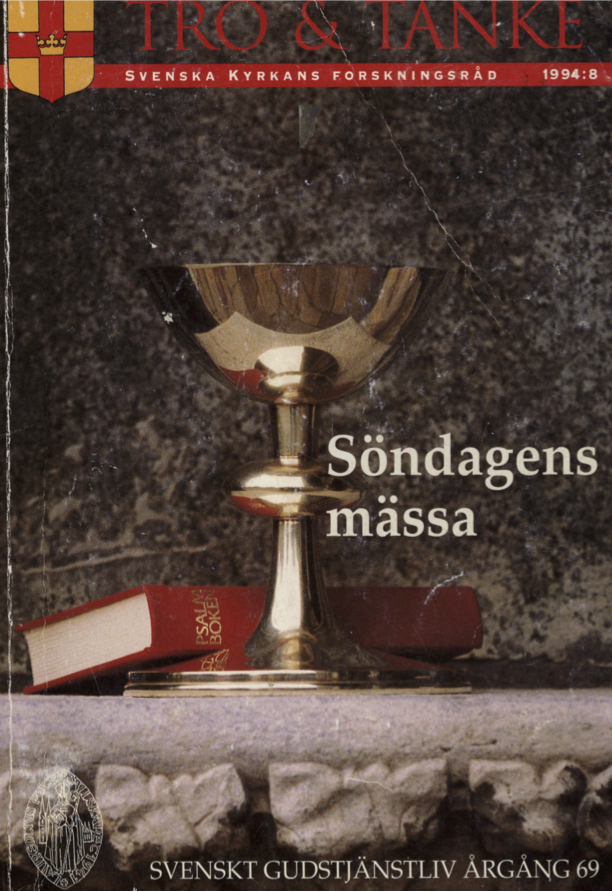Söndagens mässa ur pastoralteologiskt perspektiv
Abstract
In the ongoing change in Church life, one can now discern a clear tendency that the Sunday Eucharist will become the natural centre in each congregation. In this article, I will reflect on theological issues that co-decide the present ecclesiastical situation in Sweden as well as on a theological distinction of the meaning of Christian service, and how such a meaning could be utilized in the pastoral work with the Sunday Eucharist.
The present situation is first described from the point of view of ecclesiology. In the early 1940’s, there is a parallel interest in the concept of the Church as Corpus Christi both in Roman-Catholic and evangelical reflection. It is to be seen in the encyclical letter by Pope Pius XII in 1943 and the article on Corpus Christi, written by Anders Nygren in 1942 - later chosen as the first president of the Lutheran World Federation in 1947. The differences are obvious, but still there is a common choice of biblical theme, developed somewhat hierarchically in the Pope’s reflection and statically in Nygren’s thinking. As a reaction in the 60’s, the new concept of the People of God came to dominate for quite some time. Nowadays, this concept is no more in use and the question is if a new Corpus Christi concept could help us today. If so, it will be a concept distinctly rooted in the death/resurrection perspective, a perspective that is, strangely enough, almost absent in the writings of Corpus Christi by the Pope, in the works by Nygren as well as in several reflections on the People of God concept.
There is, furthermore, a new longing for wholistic mystics today. It is in many ways a late reaction against what has been the effects of the 18th century movements, pietism and Enlightenment, both joined in a critical attitude against the Sunday Eucharist.
There is also a new liturgical situation in the Church of Sweden today. Only a few decades ago it was obvious from the liturgical behaviour, whether the priest or the congregation belonged to a certain tradition - low church, old church, folk church or high church as they were labeled. There is now a growing and remarkable consensus in favour of a richer liturgy, clearly seen in the new Church of Sweden Manual of 1986.
A new view on the meaning of the Eucharist is coming up. The old effects from the 18th century movements have played a dominating roll when deciding on the contents of the Eucharist, both in a theological sense and in the ecclesiastical life of the congregation. New interpretations nowa- days underline motives like Thanksgiving, Praise, Adoration of the mystery, Participation, the Holy Meal as a Break in everyday life, the Incarnation of God in the Eucharist promoting a more clear local identity.
The meaning of the Christian service could he described as a meeting between God and human beings. Such a description would emphasize especially the holy character of this God/man encounter. It will also question a position that arbitrarily refuses a congregation the possibility of communion of the holy gifts in the Eucharist and offers a service without the Eucharist as the main Sunday service only. Such a position cannot be justified in a conscious pastoral theology. Instead, the solution for those who do not want to communicate every Sunday should be searched for in the concept of spiritual communion, already commended by the late Swedish Archbishop Brilioth in the 1920’s.
A growing consciousness of the Sunday Eucharist must also take into consideration the tension between form and content. A common way in the evangelical tradition is to underline the content so much that the form is almost neglected. This cannot be accepted when the meaning of the Christian service is taken seriously. The form in which the Eucharist is celebrated often speaks a louder and more distinct language than all verbal expressions, however gifted.
Furthermore the Sunday Eucharist should be characterized by an affability with low thresholds, so that people can enter easily and - when entering - they should meet the mysteries of the Church, the most holy centre. From this basic thinking, a number of practical questions are being reflected upon, all as consequences of the fundamental pastoral theological reflection. Such questions are: the balance between movement and tranquility, between sound and quietness, between women and men, between grown-ups and children, the question of all senses, the furnishing of the altar, and the way of distributing the holy gifts in the eucharistic meal.
Downloads
Publicerad
Nummer
Sektion
Licens
© författarna, Laurentius Petri Sällskapet för svenskt gudstjänstliv samt Artos & Norma bokförlag. Det är tillåtet att kopiera och använda material ur Svenskt Gudstjänstliv för forskningsändamål om källan anges. För övriga ändamål kontakta respektive artikelförfattare samt förlaget. Särskilda restriktioner kan gälla för bildmaterial.


